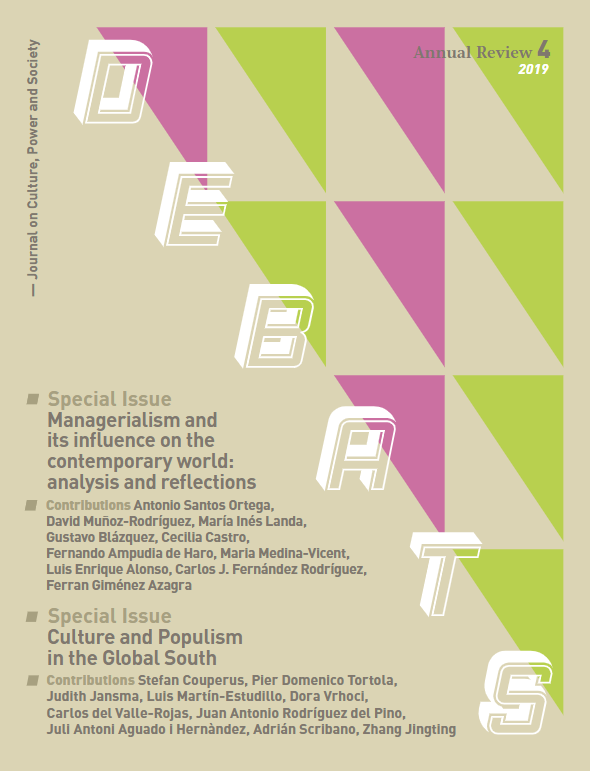Culture in the Name of the People? Towards a typology of populism and culture
DOI:
https://doi.org/10.28939/iam.debats-en.2019-10Resum
Populism is a topic that has been widely studied over the past decades but mostly from a political perspective. These contributions mainly focus on the analysis of populism as a (socio) political phenomenon placed in a historical, global context. A second field of interest covers the mass appeal of populist parties. The latter is not only a timely, highly relevant issue right now but also sheds light on the flaws of liberal democracy. While a lot of academic effort has been put into defining populism and explaining the reasons for its success, the underlying cultural beliefs on which populist ‘us and them” dichotomies are based remain unclear. We shall therefore come up with a typology of culture and populism. This typology will reveal how various aspects of culture (such as popular culture, cultural images,
and literary works) are prevalent in the populist construction of ‘us’ and ‘them’.
Based on examples from France and The Netherlands (two countries with major right-wing populist parties), the typology will differentiate between sociofacts, mentifacts and artifacts (cf. Huxley), and their use and appropriation by populist actors. The artifacts category comprises what I call ‘organic authors’ and ‘appropriated authors’, a terminology borrowed from Gramsci. The difference between the two, as will be shown, is the author’s identification with and articulation of certain kinds of ideas
Descàrregues
Descàrregues
Publicades
Com citar
Número
Secció
Llicència
Sense perjudici del que disposa l'article 52 de la Llei 22/1987 d'11 de novembre de Propietat Intel·lectual, BOE del 17 de novembre de 1987, i conforme a aquest, els/les autors o autores cedeix/en a títol gratuït els seus drets d'edició, publicació, distribució i venda sobre l'article, per tal que siga publicat a Debats. Revista sobre cultura, poder i societat.
Debats. Revista de cultura, poder i societat es publica sota el sistema de llicències Creative Commons segons la modalitat “Reconeixement – NoComercial (by-nc): Es permet la generació d’obres derivades sempre que no se’n faça un ús comercial. Tampoc no es pot fer servir l’obra original amb finalitats comercials”.
Així, quan l’autor/a envia la seva col·laboració, accepta explícitament aquesta cessió de drets d’edició i de publicació. Igualment autoritza Debats. Revista de cultura, poder i societat la inclusió del seu treball en un fascicle de la revista perquè es puga distribuir i vendre.











